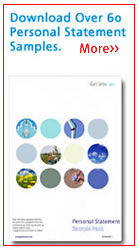Grammar And Style
Hot Editor Tips
Limit the use of long words.
The first mistake students make is to use very long words. There's nothing wrong with long words, but if used inappropriately, long words can hinder your application. For example words such as functionality and methodology have their correct use. But if you need a concise approach, think about using function and method.
Use a combination of long and short sentences.
Perfecting your sentences is the most critical element of any personal statement. A good personal statement will contain a mixture of both long and short sentences. Read your personal statement aloud, count how many words each sentence contains and look to remove unnecessary words.
Apply - Show, Don’t Tell rule (SDT)
One rule in writing is "Show Don’t Tell" the rule is not always obvious. Admissions officers don’t necessary believe what they are told. So when you really need them to believe something, it's better to show it to them rather than to tell them about it. A persuasive personal statement convinces the reader.
"I'll never forget how upset I felt after Sarah was ill. I was upset."
The passage above names the feeling rather than showing what they felt. Wording can be improved from changing "upset" to "distressed".
Get your grammar right.
Given the importance of your personal statement, grammar and punctuation are critical. Punctuation can change the meaning of a sentence or paragraph, therefore, it is useful to be aware of the grammar and punctuation errors that frequently occur.
Grammar guide:
- Keep your sentences short and to the point.
- Every sentence begins with a capital letter and ends in a full stop, question mark, or exclamation mark.
- Avoid using superfluous words.
- Use simple words. For example, use instead of utilise/utilisation, sign(s) instead of signage, link instead of linkage, and (as an adjective) local instead of localised.
- Use serial commas, those commas that are before the "and" in a series.
- When using quotation marks, the comma and the full stop are placed inside the closing quotation mark. The semicolon is placed outside the closing quotation mark.
- Use one space after full stops and colons (referred to as close spacing). Word processing programs now incorporate proportional spacing, which typewriters did not, and this precludes the need for double spaces between full stops.
- Most words with "multi" (multipage, multidisciplinary, multimedia) do NOT have a hyphen. This is also true for most “non” words; nonnative, nontoxic, nonmotorised.
- Use "that" for clauses that restrict the meaning of a sentence; use "which" for clauses that provide additional information and are not necessary to understand the sentence.
- Avoid the overuse of bold and italics to emphasise text. If everything is in bold or italics, then nothing is being emphasised.
- Cut down your words.
Use these hints to reduce your word count now.
You can normally delete the following without changing the meaning of the paragraph:
Amazing, fantastic, nice, terrific, cohort, context, interaction, materialise, syndrome, pretty, ambience, wanted, really, very, believe, always, honestly, seriously, confidentially, personally, surprisingly, even, for my sake, as much as possible, even, only, concerned, why, where, who, what, how, if, ideally, economically, officially, obviously, clearly, surely, undoubtedly, to conclude, conclusion, introduce, knew, surprised, therefore, however, moreover and illustrating.
- Remove "that" - unless it is necessary.
- Reword sentences containing: and, I, the, he, she, his, and her.
- Delete adverbs "ly" endings.
- Amend using the ending "ing".
- Delete "just" and "so".
- Erase "was" and "were" (these normally make the sentence passive and you should not have more than 2% in one document).
The advice of other readers will become invaluable as you build and improve your essay. Get Into Uni is a leading editing company in the UK. In all our editing services we demonstrate how your personal statement can be brought to life in a way that is relevant to you. Quickly ask yourself the following:
- Are the paragraphs linked to represent you in a clear and concise way?
- Are your sentences short?
- Are there errors?
- Are sentences clear and easy to read?
- Is the vocabulary suited to admission officers?
- Are the long sentences easy to follow?
- Have you avoided excessive repetition?
You are just moments away from working with an Oxbridge-educated editor who will provide plenty of fresh creative ideas, to really make your personal statement stand out.
Just think! - by purchasing one of our editing services you are making the most valuable investment possible; you are investing in your own future.





